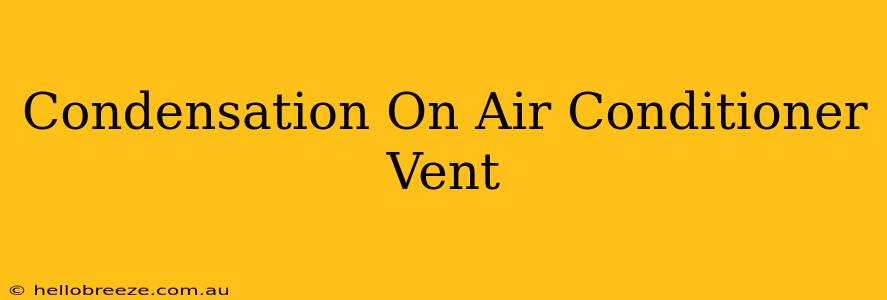Is your air conditioner leaking water? Seeing condensation on your air conditioner vent is a common problem, but it doesn't necessarily mean something is broken. Understanding the causes can help you determine if it's a minor issue or requires professional attention. This guide will cover the common reasons for condensation on your AC vent and offer practical solutions.
Understanding Air Conditioner Condensation
Before diving into the problems, let's understand the basics. Air conditioners work by removing heat and moisture from the air inside your home. This process produces condensation, which is essentially water vapor turning into liquid. Normally, this water drains away through a condensate drain line. However, various issues can cause this condensation to appear on the vent itself instead.
Common Causes of Condensation on Your AC Vent
-
Clogged Condensate Drain Line: This is the most frequent culprit. A blocked drain line prevents the condensed water from properly draining, leading to a buildup that eventually spills out of the vent. This blockage can be caused by algae, mold, mineral deposits, or even dirt and debris.
-
Insufficient Drainage Slope: The condensate drain line needs a slight slope to ensure proper drainage. If the slope is insufficient or even reversed, water can back up and leak from the vent.
-
Frozen Evaporator Coil: A frozen evaporator coil restricts airflow, causing ice to melt and create excessive condensation. This is often due to restricted airflow, low refrigerant levels, or a dirty air filter.
-
Leaking Air Conditioner: While condensation is normal, actual leaks in the AC unit itself can lead to excess water. This could involve leaks in the condensate pan, tubing, or the AC unit's casing.
-
High Humidity Levels: Extremely high humidity in your home can overwhelm your air conditioner's ability to remove moisture, resulting in more condensation than usual.
-
Dirty Air Filter: A clogged air filter restricts airflow, forcing the evaporator coil to work harder and potentially freeze, leading to condensation issues.
Troubleshooting and Solutions
Now that we've identified the common causes, let's explore how to address them:
1. Check and Clean the Condensate Drain Line
This is the first step. Locate your condensate drain line (usually a PVC pipe) and check for blockages. You might need a wet/dry vacuum or a plumbing snake to clear any obstructions. You can also pour a mixture of water and drain cleaner down the line to help remove any buildup. Remember to always consult your air conditioner's manual for specific instructions.
2. Verify Proper Drainage Slope
Ensure your condensate drain line has the correct slope. A plumber's level can be used to check the incline. If the slope is incorrect, you may need to adjust the line or call a professional for assistance.
3. Inspect and Clean the Air Filter
A dirty air filter significantly reduces airflow, potentially leading to a frozen evaporator coil. Replace your air filter regularly (check your manufacturer's recommendations) with a fresh, clean one. This is a simple fix that often solves condensation problems.
4. Examine the Evaporator Coil
If you suspect a frozen evaporator coil, turn off your air conditioner and allow it to thaw completely. Once thawed, visually inspect the coil for any debris or ice buildup. Clean the coil gently using a coil cleaning brush or a shop vacuum. If the problem persists, you might have a refrigerant leak, requiring professional attention.
5. Address High Humidity Levels
If you live in a very humid area or your home has persistently high humidity levels, consider using a dehumidifier in conjunction with your air conditioner. This can help to reduce the overall moisture load and minimize condensation.
6. Look for Leaks
If you've ruled out the other causes and still have condensation on your AC vent, there could be a leak within the air conditioner unit itself. In this case, it's crucial to contact a qualified HVAC technician for professional inspection and repair.
When to Call a Professional
While many condensation problems can be tackled with DIY solutions, some situations require professional help. Contact an HVAC technician if:
- You suspect a refrigerant leak.
- You cannot locate or access the condensate drain line.
- You've tried the above solutions and the problem persists.
- You’re uncomfortable working with your air conditioning system.
Addressing condensation on your air conditioner vent promptly can prevent more significant problems down the line. By understanding the causes and implementing the appropriate solutions, you can keep your AC unit running efficiently and prevent potential water damage. Remember safety first! If unsure, contact a professional.

